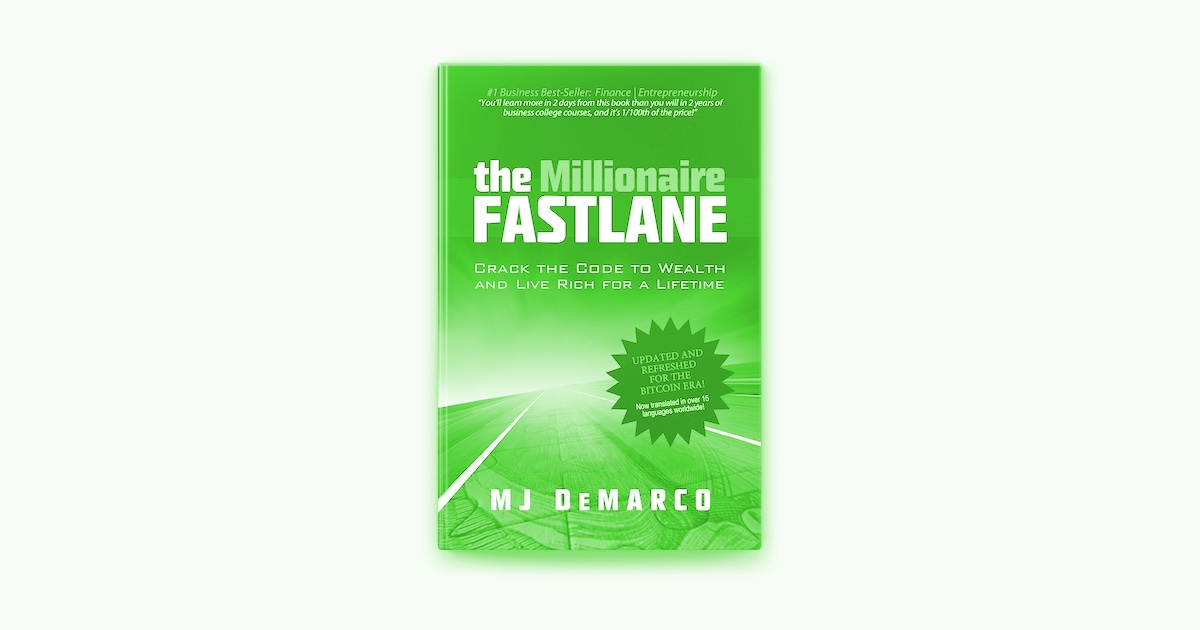This book has been receiving an increasingly warm reception from entrepreneurs over the past few years, and it’s largely justified. The author manages to trace the reasons for his own success while formulating key principles that give it a systematic character. Let’s see what interesting ideas emerge from this book. Let’s see how they can help you create your own ideal professional career by overcoming the pitfalls that stand in your way.
1- The metaphor of the fast lane on the highway, the slow lane and the passerby on the sidewalk
Your professional career can be summarized as going from point A to point B. Point B being your financial freedom that allows you to live the life you aspire to. According to De Marco, there are three types of profiles that correspond to three specific types of individuals who approach their professional career in different ways.
Those who walk on the sidewalk
This is the path of those who do not have a career plan, who live from day to day on odd jobs and have no way to save and are therefore condemned to never achieve financial freedom. Their only salvation is to win the lottery one day.
Those who are on the slow track
These are the majority of people. They have bought into the thinking that it is safer to work 40 years of your life and hope to eventually have 10 to 20 years of retirement to enjoy financial freedom. Their enrichment is limited by a host of constraints including the inability to use leverage (brand awareness, marketing, etc.) to increase their income potential tenfold.
Those who take the fast track to the highway
These are the ones who embody the path advocated by the author, they seem to have taken more risks than the others, but what De Marco tells us is that they have a much greater expectation of gain than the two categories previously mentioned. The people who take the millionaire’s highway actually have the possibility of using one or more levers of enrichment, which is what distinguishes them from the other categories.
Chances of success for the passerby on the sidewalk:
First prize: €10,000,000 awarded immediately. Your chances of winning: 1 in 6 million (.0000016%), which corresponds to winning the lottery.
Odds of success of the slow lane:
First prize: €500,000 to be won in 40 years. Your chances of winning: 1 in 6 (16%). This path is not safe as economic crises have highlighted the fragility of pension funds and savings invested in the stock market.
The chances of success of the fast track:
First prize: €10,000,000 to be won in 6 years. Your chances of winning: 1 in 7 (14%)
As you already know, entrepreneurship is an uncertain profession, but according to MJ De Marco, it is the path that offers the greatest hope of gain.
Of all the options available to us, one is actually much better than the others, it is the last one, even if at first sight we would have intuitively bet on the second option if we did not know the numbers.
The respective payoff expectations are as follows:
The passerby on the sidewalk: 10,000,000 x 0.0000016% = €0.16
The driver in the slow lane: 500 000 x 16% = 80 000€.
The driver on the fast lane: 10 000 000 x 14% = 1 400 000 €.
2- Happiness is not doing what you like, but having the choice to use your time as you wish
Stop thinking about business in terms of your selfish desires, whether it’s money, dreams or “doing what you love”. Instead, pursue needs, problems, pain points, service deficiencies and emotions.” – MJ De Marco
De Marco cautions us about the common idea of doing what you love. Doing so is a handicap in a world governed by the laws of supply and demand because it is a fundamentally selfish idea. If you want to stand out from the crowd, you have to be empathetic and truly serve your customers or you will fail miserably. Those who start from the paradigm of “doing what they like” run a double risk. The first is that they simply don’t like what they do anymore. When you turn a passion into a business or a profession, you introduce an element of interest that corrupts the relationship you might have had with that passion. Secondly, starting from a selfish assumption limits our chances of success since it is not a customer-oriented way of thinking.
3- The world is divided into two entities: consumers and producers
To be part of the camp of those who have a choice, one must voluntarily become a producer, i.e. have a contribution to the world. Being a consumer exposes us to many risks, including missing out on opportunities that seem obvious to those with a producer mentality.
The importance of the producer mentality
Having a producer’s mindset does not only mean being willing to bring value to the rest of the population, it also means not falling victim to the traps of the consumerist world. When we adopt the producer mindset, we are not easily fooled by enticing advertisements or commercial schemes designed to make us spend as much as possible. On the contrary, our view changes and we can learn from these same processes. An advertisement is no longer an attempt at manipulation but a learning exercise where we evaluate the strategies used thanks to a sharpened observation mind.
4- Create a business and respect 5 key principles
As you will have understood, the royal road to financial independence is via the creation of a business. Nevertheless, De Marco warns us about the need to respect 5 essential pillars to succeed.
1) Control
If you want to increase your chances of success in creating a business, you should never give a third party control over your company (pricing policy, marketing strategy etc.). Of course, you cannot totally emancipate yourself from a third party control, starting with the state and its laws. Apart from this type of control, you must avoid any activity that prevents you from exercising your vision freely (e.g.: being a franchisee, multi-level sales marketing, etc.)
2) Entry
Beware of businesses with no entry fee where entry is just an event and not a process. The easier it is to enter a market, the more competitive it is, the less likely you are to make money.
3) The need
Are you truly meeting a need of your prospects or are you trying to satisfy a narcissistic need. Make sure you don’t venture into a business where you don’t bring any real value to people but to yourself, you will end up losing feathers.
4) Time
Your income must ultimately be decorrelated from time. If you can’t do that, you will be limited like a car on the highway with a speed limiter.
5) Scalability
Choose a type of business that allows you to scale, otherwise you will be limited in your income. To do this, you need to use different types of levers.
5- The 5 types of levers
Rental-based businesses: real estate, licensing your ideas or collecting royalties on books, music, etc.
Online businesses (computer and software): e-commerce, advertising, subscriptions, applications, etc.
Content companies: blogs, vlogs, books, etc.
Distribution businesses: retail and franchising are all about distributing products. Getting products to people can be as important as making the product.
Employee-run businesses: It can become tedious to manage too many employees. This is one of the main reasons why De Marco ended up selling his company.
6- The 5 most important things to watch out for in order of importance
As a business owner, you should always prioritize. De Marco gives us the ranking of the points to take into consideration when you are an entrepreneur. He uses the analogy of a chess game.
The King: Execution
Wherever you are in the development of your business, execution should always take precedence over the other dimensions of your daily organization. Execution is your centerpiece, and it must be constantly protected.
The Queen: Marketing
A good product with bad marketing is rarely bought. A bad product with good marketing is more likely to be sold. That’s why marketing is your second most important asset.
The fool: customer service
Good customer service allows you to sustain your sales while improving your brand image.
The horseman: the product
A good product sells more than a bad product if the 4 previous points are equivalent in both products.
The tower: your staff
You can always sell if you have a bad staff, but having a good staff gives you a decisive advantage over your competitors.
The pawn: the idea
An idea is worthless if it is not executed. Better a mediocre idea implemented than a great idea left on the shelf.




